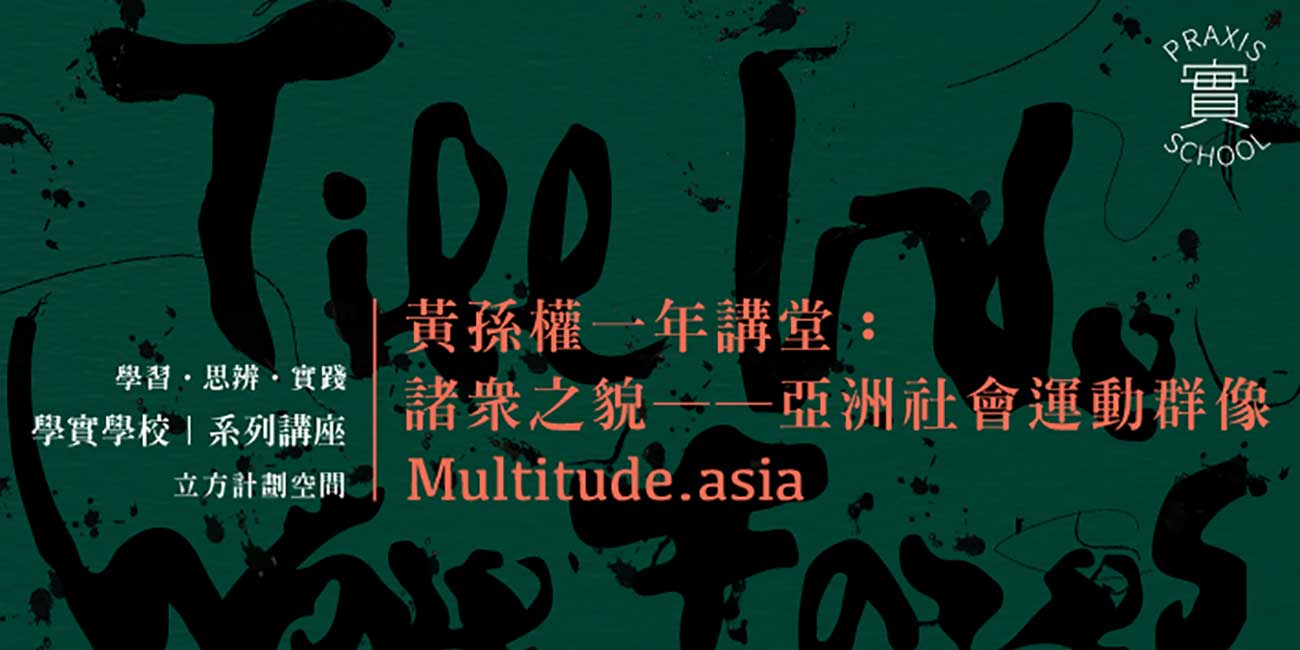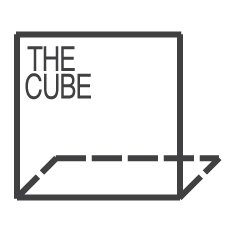
Lecture by Huang Sun-Quan: Multitude: Till We Have Faces!—The Images of Social Movements in Asia
Praxis School is the thematic lecture series to be hosted by TheCube Project Space in 2016. Inviting experienced professionals, we organize the lecture series into systematic courses/workshops in which the lecturers will dilate upon the subjects and thoughts they seek to share with the participants.
The first series will be delivered by Huang Sun-Quan, a renowned social activist and cultural researcher, with “Multitude: Till We Have Faces!” as the theme that runs through this series. Based on his long-term research and practice in social movements, along with the content of Multitude.asia (i.e. an image database of social movements in Asia established by him and his team), Huang will deliver a series of three-hour lectures on a monthly basis and give the participants a contextual and systematic understanding of contemporary social movements in Asia. This series is scheduled for each month of 2016, during which the participants will be requested to discuss the associated readings and organize a thematic exhibition collectively in collaboration with the lecturer. It is not only an intellectual activity but also a collective creative project.
About The Theme of the Lecture Series
By Huang Sun-Quan
Innumerable terms such as people, public, crowd, mass, multitude, and class have been created to describe social gatherings. Intellectuals and populists have shown as much enthusiasm as the top-down power deployments have done in applying these terms. Thanks to the advances in network technologies, these terms have appeared on various communications media and have been increasingly referring to the exactly opposite affairs that fall in line with the preferences of elites, minorities, and the bourgeoisie. Today, we attempt to redefine the meanings of these terms. However, our purpose is not so much to give these terms rigid definitions as to interpret them variously until they take on diverse appearances. Invoking the metaphor of plants, we are looking for the seeds of social dynamics rather than its flowers.
Nevertheless, what we advocate is by no means an individualistic strategy for radically changing the world, since the idea that “I will keep moving forward against all odds” represents an intricate hybridization of the neoliberalist morality and the priority over scientific R&D. Instead, we examine the questions as to how a group acquires knowledge and promotes practice through self-learning and how it develops the autonomy and ability of mobilization through its connections and interaction with other groups. Treating Asia as the point of departure, we plan to build up an archive of group interaction in the lecture series, and thereby explore the diverse appearances of multitude.
Topics and Schedule
# 1
The Trilogy of Empire: Empire, Multitude, and Commonwealth (Part I)
2-5 p.m., 23 January 2016 (Sat.)
A new type of empire has risen. Different from the Second Hundred Years’ War fought between Great Britain and France throughout the eighteenth century and the American global hegemony after the Second World War, the empire referred to in this lecture is a new form of sovereignty that restructures the subjectivity of the world and individuals. This lecture will collate the contemporary global politics and the resistant subjective agents therein by reference to Empire / Multitude / Commonwealth, the trilogy co-authored by Michael Hardt and Antonio Negri.
# 2
The Trilogy of Empire: Empire, Multitude, and Commonwealth (Part II)
2-5 p.m., 20 February 2016 (Sat.)
# 3
Neo-liberalism and Neo-imperialism
2-5 p.m., 2 April 2016 (Sat.)
Neo-liberalism and Neo-imperialism are two sides of the same coin. We will learn the force principale of global political and economic structures by reading two books written by David Harvey. Instead of regarding the globalized space as a predetermined outcome, we must contemplate the globalized production in terms of spatial production. Since space is no vessel, its status quo is not directly dictated by (economic and political) globalization. Rather, space per se is the dominant factor behind the redistribution of global capital. Only by closely investigating the process of spatial production can we transform the claim of “all things in their being are good for something” into the action plan for reclamation. Given the dual-structure of Neo-liberalism and Neo-imperialism involved, we should transform the space of anti-globalization into an alternative one of counter-globalization.
# 4
A Companion to Marx’s Capital by David Harvey
2-5 p.m., 30 April 2016 (Sat.)
Karl Marx’s stimulating idea is an invaluable source of reference for us to acquire the knowledge of analyzing current global and local predicaments as well as the content of the previous two lectures, whereby we achieve liberation. Reading Das Kapital: Kritik der politischen Ökonomie may be a daunting challenge. However, we can grasp the essence of the key chapters (particularly those in the first volume) of Das Kapital and map globalization with minimal effort by reading David Harvey’s A Companion to Marx’s Capital.
# 5
Social Movements in Hong Kong: Media, the Arts and Action Plans
2-5 p.m., 28 May 2016 (Sat.)
Founded in Hong Kong, 2004, Hong Kong In-Media (http://www.inmediahk.net) has engaged in a riotous profusion of social movements such as the protests during the WTO Hong Kong Ministerial Conference (2005), the preservation campaign of Star Ferry and Queen’s Piers (2006-2007), the Choi Yuen Village event and the Occupy Central movement (2009), the campaign against the Northeast New Territories Development Plan (2011), and the Hong Kong dockworkers strike (2012). It has become a base for social mobilization in Hong Kong and a platform for opinion exchange. Meanwhile, it gradually re-orientates itself from an antagonist of mainstream media to a professional electronic media platform.
# 6
Investigating the Social Movements in Taiwan since the 1990s
2-5 p.m., 25 June 2016 (Sat.)
Taiwan’s economy hummed along to its peak growth rate in the 1990s. New urban social movements emerged out of opposition to the state-capital liaisons in development-oriented cities. They galvanized people into collective actions, forged people’s project identities, and mounted the resistance against bourgeois dreams of avarice. By virtue of theoretical perspectives and field studies, this lecture reviews contemporary urban environment and cultural governance in Taiwan as a direct consequence of many social movements such as the Snails without Shells movement, the Anti-Green Bulldozer movement, the Treasure Hill anti-relocation movement, the sex workers’ rights movement, the movement of preserving Lo-Sheng Sanatorium and Hospital.
# 7
The Tent Theatre and the Art Occupy Movement in Japan
2-5 p.m., 30 July 2016 (Sat.)
Daizo Sakurai’s tent theatre is a great cultural legacy of the student movement in Japan from the 1960s. It appropriated the form of theatre to make political noise and mount resistance. The theatre has never received any subsidy from governments and enterprises. By virtue of his unique way of working, Daizo Sakurai created an autonomous system of theatre and performance in Japan, Taiwan and Beijing, a system that wields profound and far-reaching influence on the next generation of intellectuals.
# 8
After the Gwangju Uprising: The Wild Chrysanthemums, People’s Daily and the Left-wing Artists
2-5 p.m., 27 August 2016 (Sat.)
Paik Nak-Chung’s ideas about overcoming the crisis of division system and creating the 2013 regime serve as a critical entry point for us to understand the social movements in South Korea. This lecture introduces three cases, namely the Wild Chrysanthemums (the most iconic band in South Korea’s democratization process, formed after the Gwangju Uprising in the 1980s), People’s Daily (the first crowd-founding newspaper in the history of South Korea), and the artworks created by left-wing artists, for the purpose of identifying the approaches of South Korean cultural practice after democratization.
# 9
Two Leftist Bookstores: Tangshan in Taiwan and Pirate ISBN in Malaysia
2-5 p.m., 1 October 2016 (Sat.)
Tangshan bookstore run by Chen Long-Hao and Pirate ISBN by Zhang Yong-Xin (transliteration) have respectively cultivated a new generation of students with leftist thoughts. Over the past three decades, the two bookstores started up by piracy and self-publishing, and then re-orientated themselves to supporting the publishing of less-profit seeking social thoughts series. The young people who benefited from them are now becoming the ideological backbone of both societies.
# 10
The People’s Science Movement in India
2-5 p.m., 29 October 2016 (Sat.)
A number of nuclear scientists who studied abroad in the Soviet Union gave up their high-paying jobs as researchers and devoted all their energies to the anti-illiteracy campaign in India. They redefined science by editing textbooks, staging dramas, performing music, and organizing workshops. Science is a tool for people to acquire knowledge. Literacy refers not only to the ability of reading and writing but also to that of problem-solving. Nowadays, ten thousands of volunteers engage in the movement and millions of people benefit from it.
# 11
Wrap up / Exhibition Planning
2-5 p.m., 26 November 2016 (Sat.)
Each participant is required to submit a thematic report, sharing his/her case study on pivotal social movements or artistic practice in contemporary Asia, so as to formulate a proposal concerning the arrangement of the exhibition on Asian multitude through reciprocal learning and discussion.
# 12
Wrap up / Exhibition Planning
2-5 p.m., 7 January 2017 (Sat.)
Participants clarify the concrete content and the division of labor for the exhibition, and thereby transform their one-year reading and studying into actual curatorial practice.


